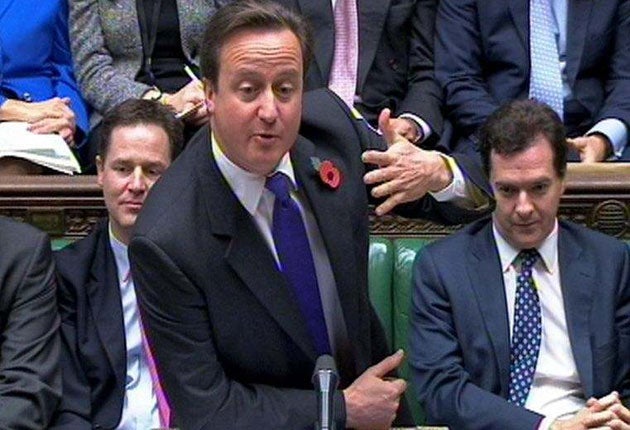Prime Minister faces battle over rise in European budget

David Cameron won the support of ten other countries last night in his battle to veto an above-inflation boost to Europe's budget.
MEPs and Brussels officials stepped up demands at an EU summit in Brussels for an increase in spending of almost six per cent. But a group of national leaders including the Prime Minister – albeit still representing a minority of EU member states - are resisting the move.
Mr Cameron has accepted that the budget will still have to go up by a minimum of 2.9 per cent, which would mean a rise in Britain's contribution of more than £400m next year.
Even agreeing to that could provoke mutiny among Tory Eurosceptics. The former party chairman, Lord Tebbit, yesterday called for him to block any rise, warning he risked a "Vichy-style" surrender if he handed over any more money to Brussels.
After arriving in Brussels, Mr Cameron secured the support of German Chancellor, Angela Merkel, and French President Nicolas Sarkozy for limiting the increase to close to 2.9 per cent.
His stance was also backed by the Netherlands, Sweden, the Czech Republic, Denmark, Austria, Finland, Slovenia and Estonia.
The 11 have enough votes to form a "blocking minority" if the rest of the member states try to settle on a higher figure than 2.9 per cent.
The wrangle over the EU's 2011 budget looks likely to drag on for at least another fortnight with MEPs and European officials on one side and government ministers on the other.
The battle-lines were drawn as Jerzy Buzek, the President of the European Parliament, said its demand for a 5.9 per cent was not "unreasonable" and would benefit research, the environment and education.
The European Commission also sought to bolster its case by producing figures showing that increases in the EU budget in recent years had fallen short of the rises in spending by European governments.
But Mr Cameron retorted: "I think that is completely unacceptable at a time when European countries, including the United Kingdom, are taking difficult decisions on their budgets and having to cut some departments. It is completely wrong that European institutions should be spending money on themselves."
Although the Prime Minister last week called for a complete freeze in the budget, his aides said it was now a question of capping the budget rise to 2.9 per cent, as agreed earlier this year by member states. "We will need to negotiate hard for what we want," the aide said.
Mr Cameron is also attempting to win support for a bigger budget battle – over the EU's spending plans between 2014 and 2020. Negotiations on their shape will last up to 18 months, but the Prime Minister will press for them to be pegged or even cut.
Meanwhile, Germany and France were making ground on their demand to amend the Lisbon Treaty to create a permanent rescue fund to deal with any fresh Greek-style debt crisis.
Mr Cameron is not expected to stand in the way of the move, arguing that the move would only affect countries in the single currency.
Earlier this week, there was a chorus of opposition to the plan which would involve re-opening a treaty that took eight years of fractious negotiations to cobble together and which only came into force last December.
But Ms Merkel and Mr Sarkozy have been lobbying furiously since last week, when they drafted their proposals during their meeting in the Normandy resort of Deauville. The duo have been pounding the phones all week to win over opponents and held rounds of last-minute meetings as the summit got underway at the European Council headquarters.
They also reportedly offered to support Mr Cameron's call to cap the increase in the EU budget in 2011, a trade-off that the Prime Minister had demanded as part-exchange for his backing their plan.
Chancellor Merkel first floated the idea of creating a permanent rescue mechanism during in May, when the 27 government leaders came together to avert a meltdown of the Euro, triggered the Greek debt crisis. They put up 750 billion euros in a rescue mechanism that is designed to run out in 2013.
Earlier this week, Luxembourg's Foreign Minister Jean Asselborn had led the charge against the plan on the grounds it would "plunge the EU back into months and years of navel gazing".
Join our commenting forum
Join thought-provoking conversations, follow other Independent readers and see their replies
Comments
Bookmark popover
Removed from bookmarks